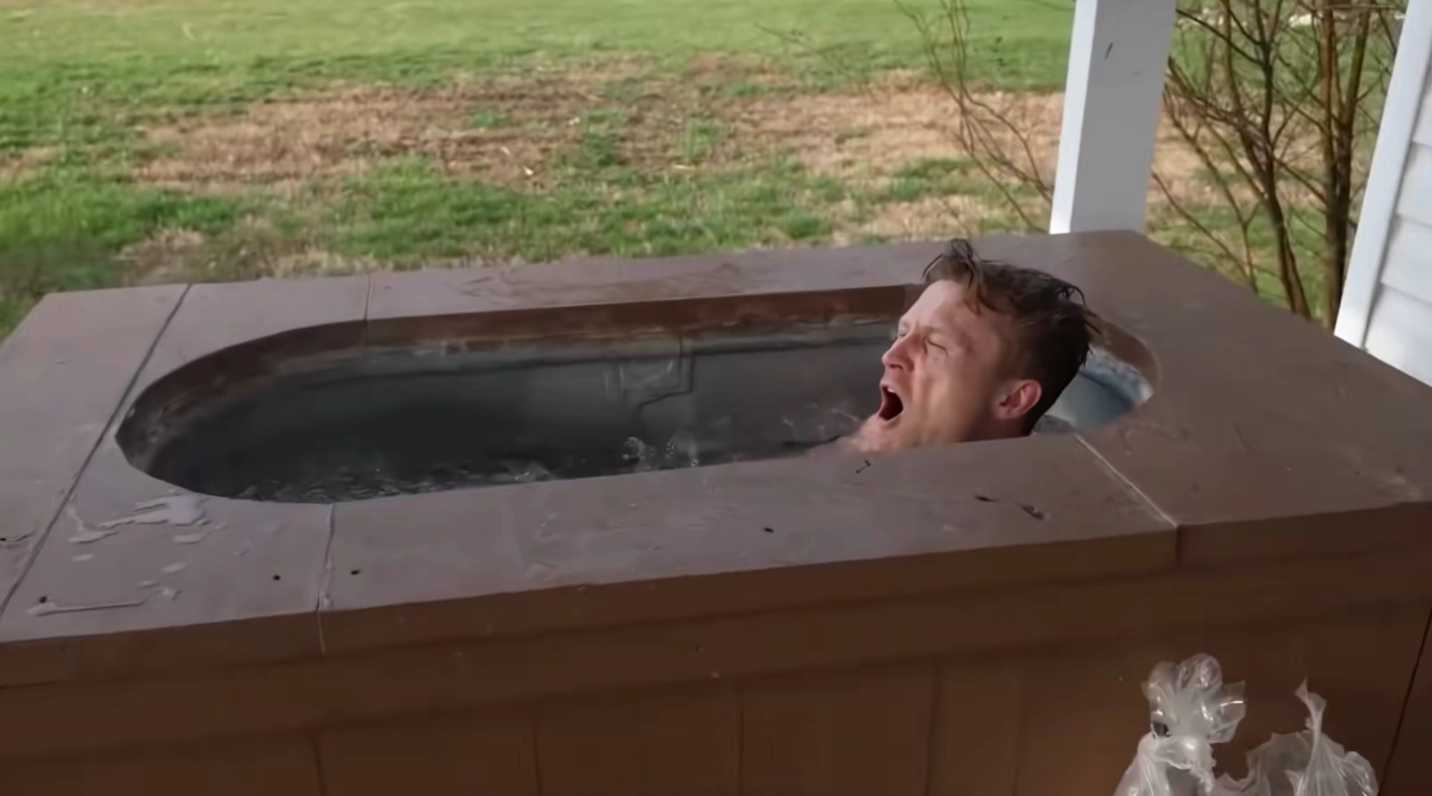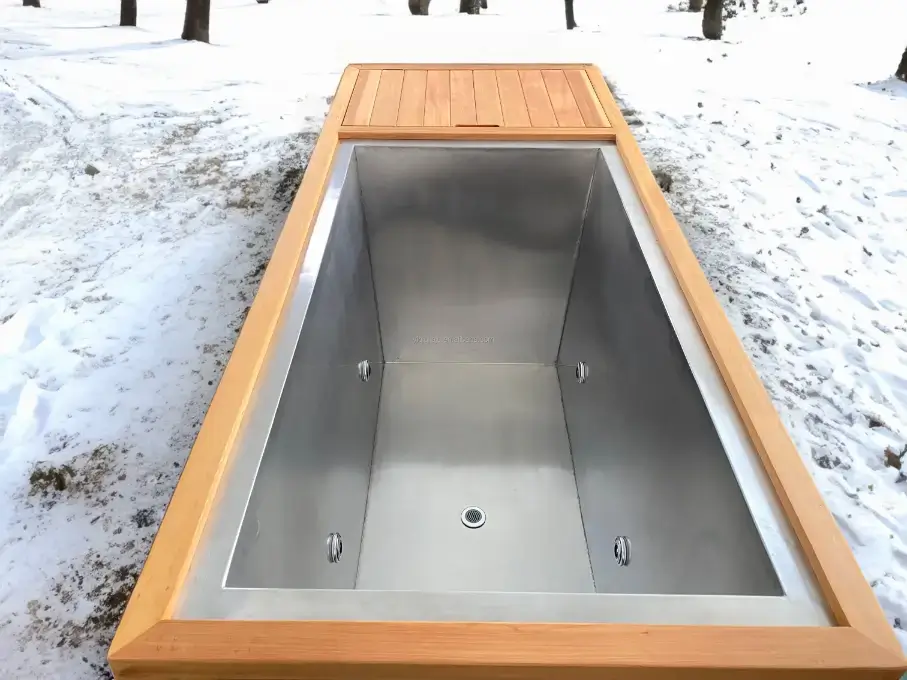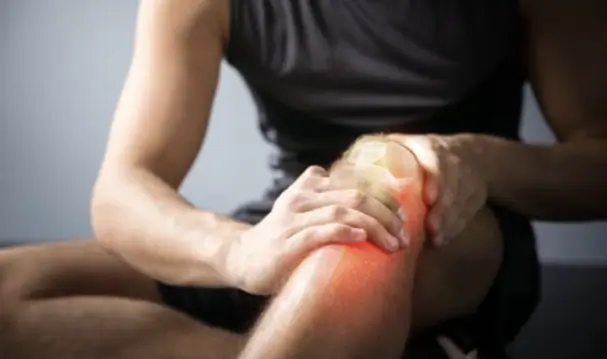5 Tips and Costs for Using an Ice Bath at Home
5 Tips and Costs for Using an Ice Bath at Home
Cold baths have been used as a therapy for depression for more than 100 years.
Vincent van Gogh, the renowned Dutch artist, once found himself immersed not only in the vibrant colors of his canvases but also in the icy depths of a therapeutic practice: ice baths. Despite the vivid hues he painted on his masterpieces, van Gogh’s personal life was often overshadowed by struggles with mental health.
The Dutch artist Vincent van Gogh, while in an asylum, was prescribed two cold baths a day. The body releases chemicals in response to cold exposure and specific breathing techniques that act to suppress inflammatory cytokines. Reducing inflammation may be beneficial for a variety of physical and mental conditions.
If you want to learn more about the benefits of ice baths, check out the article ” 7 Health Benefits Of Ice Baths.”
Who should do ice baths?
Fitness Enthusiasts
Typically, adults who enjoy fitness activities can consider trying ice baths. Ice baths are known to help alleviate muscle soreness and inflammation, promoting quicker recovery.
Professional Athletes
Athletes, especially those engaged in high-intensity training, may benefit from incorporating ice baths into their recovery routines. Ice baths can aid in muscle recovery, reducing pain and inflammation after intense workouts.
Chronic Pain Patients
Some individuals dealing with chronic pain conditions, such as arthritis sufferers, may find relief through ice baths. This therapeutic approach can effectively alleviate joint pain and inflammation, thereby improving overall well-being.

Who should not do ice baths?
Cardiovascular Disease Patients
Ice baths are not recommended for individuals with existing cardiovascular diseases, especially those with arrhythmias, hypertension, or other heart conditions, as they may increase the cardiovascular burden.
Cold-Sensitive Individuals
Ice baths may pose risks for individuals who are sensitive to cold or have low body temperatures, particularly the elderly and children, as they may lead to excessively low body temperatures and increase the risk of infections and other health issues.
Immunocompromised Individuals
Ice baths are not advisable for individuals with compromised immune systems or weakened immunity, such as those undergoing chemotherapy or with immune system disorders, as they may suppress the body’s immune response.
Other Special Populations
Pregnant women, individuals with diabetes, neurological disorders, and other special populations should consult healthcare professionals to determine whether ice baths are suitable for them.
How to do ice baths at home cheap?
Equipment and Materials
If your bathroom already has a sufficiently large bathtub, you may only need to purchase some ice cubes or ice packs to create the ice water. Purchasing enough ice cubes may cost anywhere from a few dollars to several tens of dollars, depending on the prices of ice cubes in your area. If you don’t have a large enough bathtub, you may need to consider purchasing an inflatable bathtub, which will incur additional costs.
Water Costs
Ice baths require a large amount of water, which may increase your water bill. Water costs depend on the water prices in your area and the amount of water you use.
Electricity Costs
If you use a cold water machine to rapidly lower the water to the appropriate temperature, this may increase your electricity bill.
Taking into account the above factors, the cost of an ice bath may range from a few dollars to several tens of dollars, depending on the price level, water costs, and electricity costs in your area. It’s worth noting that the cost of an ice bath may incur one-time expenses such as ice cubes, water, and electricity, while equipment like bathtubs and cold water machines are one-time purchases that can be used multiple times.
FURTHER READING
Cold Plunge Therapy – Advice for home use
Usage Time
Typically, the recommended duration for an ice bath is 15 to 20 minutes. Prolonged immersion may lead to skin damage or discomfort, so it’s advisable not to exceed half an hour.
Skin Sensitivity
For individuals with sensitive skin or skin conditions, extra caution is needed when using a cold water machine to avoid excessively low temperatures or prolonged immersion, which may cause skin discomfort or inflammation. Before taking an ice bath, it’s important to check if there are any open wounds, abrasions, or other skin issues. If any issues are present, it’s best to avoid taking an ice bath to prevent infection or exacerbation of skin problems.
Cleaning and Maintenance
If you choose to use an ice bucket with a cooler, regularly disinfect and replace filters.
If you opt for an ice bucket, ensure daily water agitation, weekly water changes, and adding ice to the bath every few days to maintain water quality.
When cleaning the bathtub, use warm soapy water. It’s best to cover the bathtub to stabilize the temperature and prevent debris from entering.
Skin Protection: Before placing ice cubes into the bathtub or water bucket, it’s advisable to wrap them in a towel or cloth to prevent direct contact with the skin and reduce irritation.

Discomfort Symptoms
If excessive discomfort occurs during the ice bath, such as redness, stinging, or irritation of the skin, discontinue use immediately. If discomfort persists or worsens, it’s best to consult a healthcare professional for advice.

“Anyone can be who they want to be IF they have the HUNGER and the DRIVE.”
“Anyone can be who they want to be IF they have the HUNGER and the DRIVE.”
by the way, Which do you think is colder, taking an ice bath in -40° weather or staying outside with your clothes off?
Let me know in the comments section below!
Vestibulum ante ipsum
You also want to know these…
Vestibulum ante ipsum
5 Tips and Costs for Using an Ice Bath at Home
Cold baths have been used as a therapy for depression for more than 100 years.
Vincent van Gogh, the renowned Dutch artist, once found himself immersed not only in the vibrant colors of his canvases but also in the icy depths of a therapeutic practice: ice baths. Despite the vivid hues he painted on his masterpieces, van Gogh’s personal life was often overshadowed by struggles with mental health.
The Dutch artist Vincent van Gogh, while in an asylum, was prescribed two cold baths a day. The body releases chemicals in response to cold exposure and specific breathing techniques that act to suppress inflammatory cytokines. Reducing inflammation may be beneficial for a variety of physical and mental conditions.
If you want to learn more about the benefits of ice baths, check out the article ” 7 Health Benefits Of Ice Baths.”
Who should do ice baths?
Fitness Enthusiasts
Typically, adults who enjoy fitness activities can consider trying ice baths. Ice baths are known to help alleviate muscle soreness and inflammation, promoting quicker recovery.
Professional Athletes
Athletes, especially those engaged in high-intensity training, may benefit from incorporating ice baths into their recovery routines. Ice baths can aid in muscle recovery, reducing pain and inflammation after intense workouts.
Chronic Pain Patients
Some individuals dealing with chronic pain conditions, such as arthritis sufferers, may find relief through ice baths. This therapeutic approach can effectively alleviate joint pain and inflammation, thereby improving overall well-being.

Who should not do ice baths?
Cardiovascular Disease Patients
Ice baths are not recommended for individuals with existing cardiovascular diseases, especially those with arrhythmias, hypertension, or other heart conditions, as they may increase the cardiovascular burden.
Cold-Sensitive Individuals
Ice baths may pose risks for individuals who are sensitive to cold or have low body temperatures, particularly the elderly and children, as they may lead to excessively low body temperatures and increase the risk of infections and other health issues.
Immunocompromised Individuals
Ice baths are not advisable for individuals with compromised immune systems or weakened immunity, such as those undergoing chemotherapy or with immune system disorders, as they may suppress the body’s immune response.
Other Special Populations
Pregnant women, individuals with diabetes, neurological disorders, and other special populations should consult healthcare professionals to determine whether ice baths are suitable for them.
How to do ice baths at home cheap?
Equipment and Materials
If your bathroom already has a sufficiently large bathtub, you may only need to purchase some ice cubes or ice packs to create the ice water. Purchasing enough ice cubes may cost anywhere from a few dollars to several tens of dollars, depending on the prices of ice cubes in your area. If you don’t have a large enough bathtub, you may need to consider purchasing an inflatable bathtub, which will incur additional costs.
Water Costs
Ice baths require a large amount of water, which may increase your water bill. Water costs depend on the water prices in your area and the amount of water you use.
Electricity Costs
If you use a cold water machine to rapidly lower the water to the appropriate temperature, this may increase your electricity bill.
Taking into account the above factors, the cost of an ice bath may range from a few dollars to several tens of dollars, depending on the price level, water costs, and electricity costs in your area. It’s worth noting that the cost of an ice bath may incur one-time expenses such as ice cubes, water, and electricity, while equipment like bathtubs and cold water machines are one-time purchases that can be used multiple times.
FURTHER READING
Cold Plunge Therapy – Advice for home use
Usage Time
Typically, the recommended duration for an ice bath is 15 to 20 minutes. Prolonged immersion may lead to skin damage or discomfort, so it’s advisable not to exceed half an hour.
Skin Sensitivity
For individuals with sensitive skin or skin conditions, extra caution is needed when using a cold water machine to avoid excessively low temperatures or prolonged immersion, which may cause skin discomfort or inflammation. Before taking an ice bath, it’s important to check if there are any open wounds, abrasions, or other skin issues. If any issues are present, it’s best to avoid taking an ice bath to prevent infection or exacerbation of skin problems.
Cleaning and Maintenance
If you choose to use an ice bucket with a cooler, regularly disinfect and replace filters.
If you opt for an ice bucket, ensure daily water agitation, weekly water changes, and adding ice to the bath every few days to maintain water quality.
When cleaning the bathtub, use warm soapy water. It’s best to cover the bathtub to stabilize the temperature and prevent debris from entering.
Skin Protection: Before placing ice cubes into the bathtub or water bucket, it’s advisable to wrap them in a towel or cloth to prevent direct contact with the skin and reduce irritation.

Discomfort Symptoms
If excessive discomfort occurs during the ice bath, such as redness, stinging, or irritation of the skin, discontinue use immediately. If discomfort persists or worsens, it’s best to consult a healthcare professional for advice.

“Anyone can be who they want to be IF they have the HUNGER and the DRIVE.”
“Anyone can be who they want to be IF they have the HUNGER and the DRIVE.”
by the way, Which do you think is colder, taking an ice bath in -40° weather or staying outside with your clothes off?
Let me know in the comments section below!
Vestibulum ante ipsum
You also want to know these…
About ther Author

Welcome to our blog! My name is peter and I am the lead author of this blog. As a sport recovery practitioner and with deep interests and expertise.
I am committed to presenting complex concepts in a clear and concise manner, and enabling readers to better understand and apply that knowledge through in-depth research and experience sharing.
Thank you for reading and for your support! If you have questions or suggestions about any of the content, please feel free to contact me. I look forward to sharing more interesting and useful information with you and growing together on this journey of knowledge!
